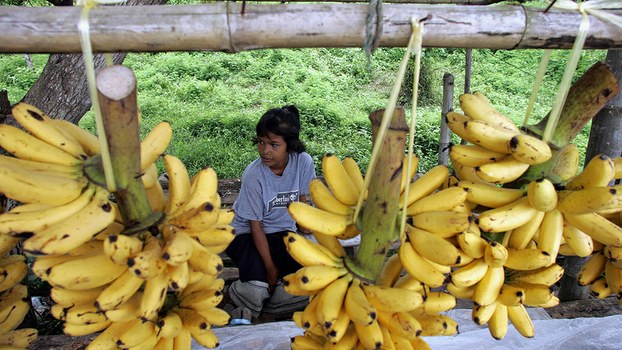




The government of Laos has vowed to enforce a ban on the granting of land for new banana plantations and punish local officials who violate it, amid a controversy over the illegal overuse of pesticides that residents say are causing pollution and destroying their livelihoods.
Concerns over chemical run-off from heavily polluting Chinese-owned banana plantations led in January 2017 to government orders forbidding new banana concessions, though many farms still operate under contracts valid for several more years.
But local officials have granted a number of firms land for new banana plantations in recent months, despite the government ban, in provinces that include Xayabury, Oudomxay, Borikhamxay, and Savannakhet, while other companies are negotiating for new farms elsewhere in the country, such as Vientiane province, sources told RFA’s Lao Service.
When asked about the recently granted concessions, Bounkhouang Khambounheuang, Deputy Minister of Agriculture and Forestry, told RFA the ban remains in place and that authorities will investigate any new banana farms.
“The government strictly maintains a ban on new banana farms in Laos and will punish those who violate the rules,” he said, adding that unauthorized plantations will have their operations “put on hold or shut down.”
“The government position is to continue to enforce the ban. We will allow people to grow new crops according to clean agricultural practices, but not bananas.”
According to RFA investigations, Chinese investors were recently granted 300 hectares (740 acres) of land to grow bananas in Xayabury’s Fieng district, 500 hectares (1,235 acres) in Borikhamxay, and an undisclosed amount of land in Oudomxay—some of which is still being negotiated with local officials.
Meanwhile, some 150 hectares (370 acres) of land were granted in Savnnakhet in 2018, sources said, while more than 5,000 hectares (12,355 acres) are under negotiation for new concessions there.
Additionally, Chinese investors are negotiating with local officials to obtain some 300 hectares of land for banana plantations in Vientiane province’s Sangthong district, about 200 hectares (495 acres) in Thulakhom district, and around 100 hectares (250 acres) in Hin Heup district, according to sources.
A Chinese investor was also granted around 300 hectares to grow bananas in Vientiane’s Naxaithong district “on the condition that he follow the government mandate on pesticide usage,” and will begin operations with plans to export to China next month, sources told RFA.
Chemical regulations
Prior to the ban on new banana plantations, several thousand hectares of land in the northern provinces of Laos had been granted to Chinese firms to grow bananas for export across the border to China, but regular complaints from residents about the liberal use of herbicides and insecticides prompted authorities to investigate and declare a moratorium on the farms.
And while existing plantations have been permitted to continue farming until their contracts expire—as long as they adhere to rules limiting the amount and type of chemicals they use—local governments lack the funding, training and resources to ensure that they operate according to regulation.
In May last year, sources told RFA that Lao workers at Chinese-operated banana plantations in Luang Namtha’s Sing district, and districts in other provinces, were falling ill in large numbers from exposure to chemicals used on the farms, with many suffering from respiratory or liver problems.
But an investigation by RFA found that as recently as this month, several villages in Sing district—where around 200 hectares of land are used to grow bananas by plantations with ongoing contracts—continue to be affected by the use of chemicals at banana farms.
A resident of Phi Yeuk village, which is home to around 370 ethnic Akha families, told RFA that when the Chinese-run farms spray pesticides, “the smell of chemicals and pollution overwhelm the village, particularly when the wind blows.”
A local official from the Ministry of Natural Resources and Environment acknowledged that the farms use unregulated pesticides to grow their crops, but said there is little than can be done to stop the practice.
“Luang Namtha province is close to the Chinese border, so it is easy to smuggle chemicals into Laos to use on plantations in ways that officials can’t detect or control,” he said, speaking on condition of anonymity.
“Because of this, the livelihoods of the local people are affected.”
The official said the banana plantations use pesticides to kill weeds, insects and snails, and that while they are permitted to use a certain amount, many of the growers “overuse them.”
In a 2016 report, the most recent available, by Laos’s Ministry of Agriculture and Forestry, six Lao farm workers died of pesticide or herbicide inhalation during the period 2012 to 2015, with three deaths reported in Champassak province in the south, and two in Xieng Khouang province and one in Bokeo province in the north.
Illnesses and deaths have long been reported among Lao workers exposed to chemicals on foreign-owned farms, with many suffering open sores, headaches, and dizzy spells, sources told RFA in earlier reports.
Chemical run-off from farms has also polluted many of the country’s water sources, killing fish and other animals and leaving water from local rivers and streams unfit to drink, sources say.
Reported and Translated by Sidney Khotpanya for RFA’s Lao Service. Written in English by Joshua Lipes.